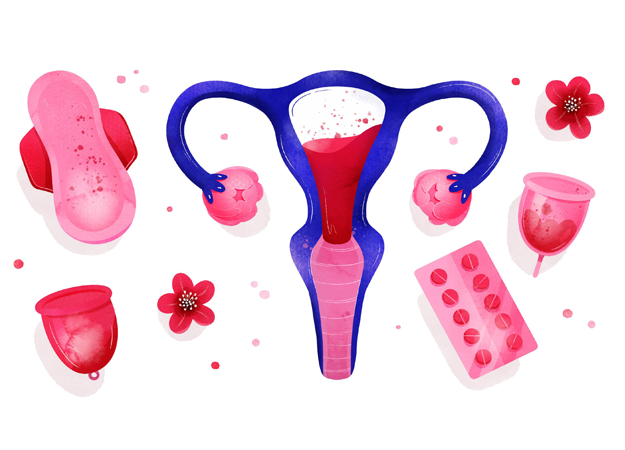
PCOS: CAUSES, SYMPTOMS & HOW TO OVERCOME THIS CONDITION?
In the previous article, we have seen what PCOS is, what happens to your body when you have PCOS, and some of the common tests used to diagnose it.
In this article, we are going to understand what are the causes of PCOS, some of the symptoms, and how to manage the condition.
1. What Are the Causes of PCOS?
The exact causes of PCOS are still unknown but experts believe that high levels of male hormones prevent ovaries from producing the hormones responsible for making healthy ovulation.
Genes, inflammation, and insulin resistance have been linked to excesses androgen production.
- Genes
Studies show that genes are responsible causes of PCOS and another study has shown that many genes can contribute to and even exacerbate the condition.
- Inflammation
Women with PCOS contain increased levels of inflammation in their bodies. Being overweight also contributes to inflammation and some studies have linked excess inflammation to the triggering of higher androgen levels.
- Insulin resistance
Insulin is a hormone produced by the pancreas that helps the body use sugar from foods for energy.
Up to 70% of women with PCOS have insulin resistance which means their cells can’t use insulin properly.
When your cells can’t use the insulin properly, the body demands to increase insulin and the pancreas makes more insulin to compensate. The insulin triggers the ovaries to produce more male hormones.
Obesity is one of the major causes of insulin resistance and both obesity and insulin resistance can increase your risk for type 2 diabetes.
2. What Are Some of the Common Symptoms of PCOS?
Some women start seeing the symptoms during the time of their first period while others discover them after they have gained weight or they’ve had trouble getting pregnant.
Some of the common symptoms of PCOS are:
- Irregular periods.
- Heavy bleeding.
- Hirsutism (excess hair on body and face).
- Acne.
- Weight gain.
- Male pattern baldness.
- Darkening of the skin.
- Headaches.
3. How Can You Manage PCOS?
The treatment for PCOS starts with lifestyle changes such as diet and exercise.
Diet changes
Low carbohydrate diets are effective in weight loss and insulin resistance.
Some foods are associated with causing inflammation in the body, thereby exacerbating PCOS as inflammation can contribute to breakouts especially if you have acne.
Avoid consuming foods such as red meat, fried foods, white bread, white potatoes, and dairy products. Cut off sugar completely from your diet and replace it with unrefined natural sweeteners such as jaggery in moderation.
Include Zinc, Omega 3, and protein-rich foods such as shellfish, eggs, chicken, beans, pumpkin seeds, flax seeds, cashews, almonds, and sunflower seeds, in your diet.
Get Lots of Vitamin D and C
Vitamin D is essential for your endocrine system. Women with PCOS can have a deficiency of vitamin D, and it’s advised to combine Vitamin D and calcium to improve your irregular periods and help you ovulate.
Weight Loss
Losing 5 to 10% of your body weight can help you alleviate PCOS symptoms by lowering insulin, improving cholesterol levels, and reducing the risk of heart complications as well as diabetes.
Exercise
Exercise is more beneficial when combined with a proper diet. Practicing exercises for at least 3 days a week, especially strength training exercises, helps to lower the insulin levels in the body and better regulate hormones.
Practice Good Sleep and Manage Your Stress
Sleep affects the stress levels in your body and regulates cortisol to balance hormones. Make sure you get a good eight hours of sleep. Practice walks outside every day and also create space in your life for relaxation and self-care.
Conclusion
PCOS disrupts woman’s menstrual cycles and makes it harder to get pregnant. With a better diet and exercise, you can manage the symptoms and conceive a healthy child. PCOS symptoms come and go and do not have a complete cure, however, it is not true that those with PCOS cannot conceive. You can give a healthy birth by improving your general well-being. Exercise, for example, is essential for hormonal balance and for reducing the size of ovarian cysts, so make sure you exercise for at least half an hour a day.
Along with exercise, consume a nutrient-rich, diet especially proteins and zinc, to manage the symptoms and enhance the quality of ovulation. AIP Protein Powder from Autoimmune Health & Nutrition is enriched with a pure source of protein that supplies your body with the amount of protein it needs while eliminating unwanted inflammation. AIP Protein is free from artificial flavors, sweeteners, and GMOs. Order yours today!
